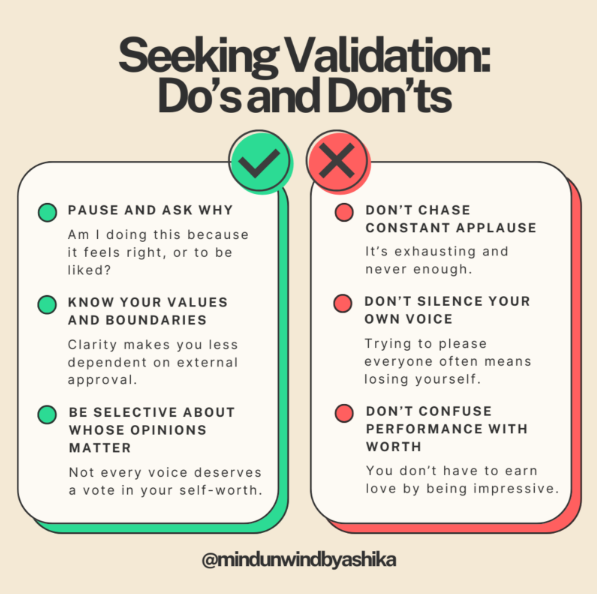
Seeking validation isn’t the problem. Losing ourselves is.
Ever wondered how many of the choices we make are truly ours, and how much comes from wanting approval and acceptance?
Think about it.
The friend who’s studying engineering because it makes his parents proud, even though he comes alive when he’s writing poetry and dreams of the stage. And now you see him losing parts of himself along the way.
The aunt who left behind a promising career to move cities every few years for her husband’s job. Everyone still talks about how devoted she was, while she quietly wonders what she really wanted.
Or the times we’ve shared something vulnerable online and then deleted it when no one responded or checked in, leaving us wondering if our pain even mattered.
We don’t always realise how much we’re shaped by the need to be seen in a certain way. But the need for validation isn’t something to be ashamed of. It’s part of being human.
So the real question is: why do we seek validation, and how do we do it without losing ourselves in the process?
Hardwired to belong: The psychology behind approval-seeking
The need for validation isn’t just emotional, it’s ancient. Psychologists Baumeister and Leary called the need to belong a basic human drive. Our ancestors survived by sticking together. Being accepted meant protection. Being excluded could put your life at risk.
That wiring still lives in us. A cold silence can feel like a slap. A harsh word can ruin our day. That’s because social rejection activates the same parts of the brain as physical pain.
So no, wanting to be liked isn’t shallow. It’s biological.
How early conditioning shapes our need for approval
In India, the fear of what others think, aka. “log kya kahenge”, is baked into how many of us grow up. From an early age, we’re trained to care about appearances. We learn to perform: be the obedient child, the high-scoring student, the polite daughter, the dependable son.
When affection hinges on meeting expectations, we start to believe that love has to be earned. That acceptance comes from people pleasing rather than being ourselves.
Most of us carry this into adulthood, often without realising it. We panic when someone’s disappointed in us. We second-guess our decisions. We say yes when we mean no.
It’s easy to call this insecurity. But more often, it’s the result of early conditioning, a script that says: shape yourself to be acceptable, and maybe you’ll be loved.
Self-worth and external validation: Are they mutually exclusive?
The need for validation becomes a problem only when it defines our worth. Healthy validation reflects what we already believe. Unhealthy validation replaces it.
When someone acknowledges your effort, honesty, or growth, and you already recognise those things in yourself, that’s healthy validation. It affirms, but it doesn’t define.
Unhealthy validation is when we depend on someone else’s approval to feel good about who we are. Over time, constantly chasing approval, whether from parents, teachers, or society, can blur our sense of self. We start tuning into other people’s expectations so much that we lose touch with our own values, needs, and instincts. And when that happens, self-acceptance becomes harder.
That doesn’t mean we should stop seeking validation entirely. It means we need to care more consciously. To know whose opinions matter, and why.
The emotional toll of chasing or denying validation
What happens when we keep chasing validation, or pretend we don’t need it at all? Either way, we lose touch with ourselves.
People who rely too much on approval often feel anxious, burnt out, and unsure of who they are without praise. But those who shut it down completely aren’t thriving either. Studies show that feeling unseen or dismissed can lead to low self-worth, shame, even depression.
Even in the workplace, not being recognised is a top reason people leave. We all want to feel valued. The key is not to run from that need, but not to be ruled by it either.
From approval to alignment
So how do we stop performing and start living in alignment with ourselves?
Start with one question: Why am I doing this?
Before saying yes or making a decision, pause. Ask yourself: Is this what I truly want, or am I just trying to be liked?
That one moment of awareness can bring you into alignment with your authentic self. It might mean choosing a career your family doesn’t understand. It might mean saying no to a project when you’re already stretched thin, even if part of you wants to look dependable.
Each time you choose what feels right for you over what is expected of you, your alignment grows stronger and your ability to accept yourself as you are gets a little deeper.
You don’t have to outgrow validation. Just redefine it.
Like most things in life, the extremes do more harm than good. It’s okay to look to others for perspective. Sometimes that helps us see ourselves more clearly. But that can’t replace your own sense of who you are.
Think of validation like a mirror. It can reflect your worth back to you, but it isn’t the source of it. That has to come from within. The mirror can show you what’s already there, but it can’t define who you are.
To let validation affirm rather than define you, you need to know yourself. What you value. What you need. What you want. And just as importantly, what you don’t. Set boundaries around what doesn’t align with that.
Because the deepest sense of belonging doesn’t begin when others finally see you. It begins the moment you do.
Disclaimer
Views expressed above are the author’s own.
END OF ARTICLE